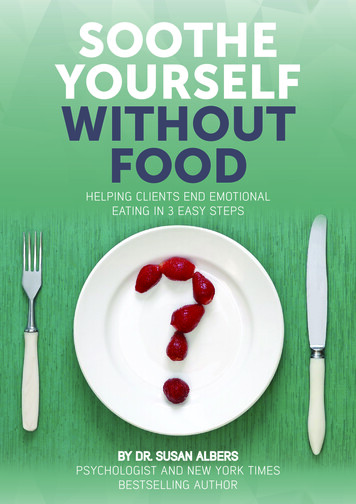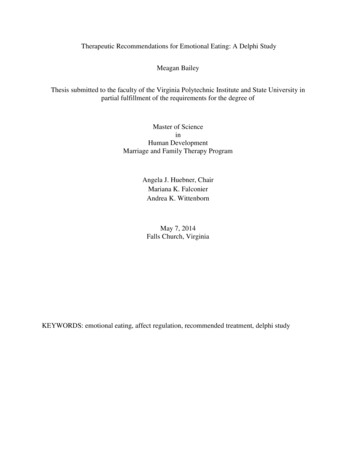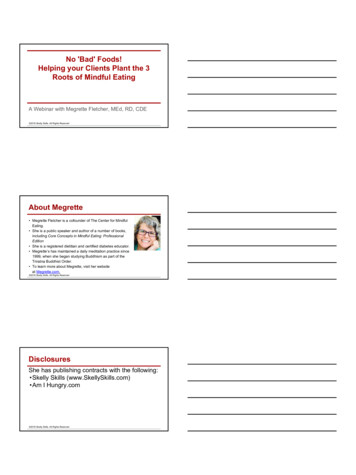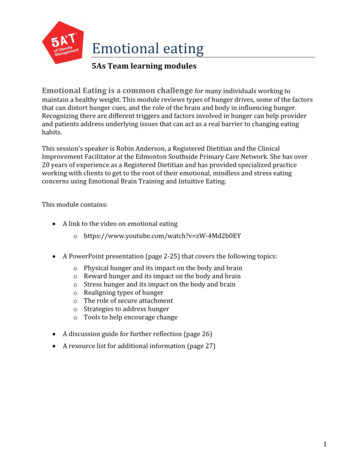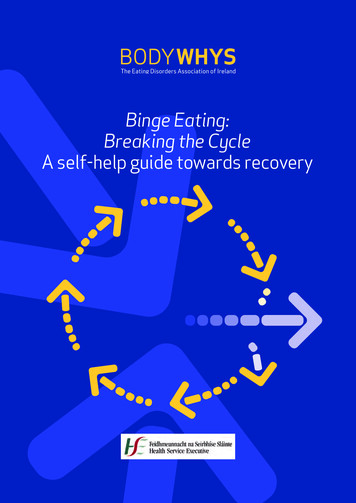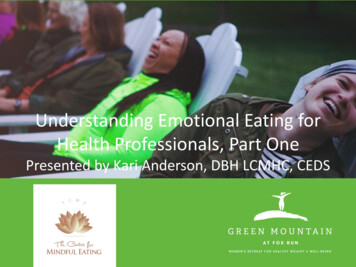
Transcription
Understanding Emotional Eating forHealth Professionals, Part OnePresented by Kari Anderson, DBH LCMHC, CEDSGREENMOUNTAINAT FOX RUNFITWOMAN.COM
Disclosure:ExecutiveDirectorGREENMOUNTAINAT FOX RUNFITWOMAN.COM
Disclosure:Co-authorofbookGREENMOUNTAINAT FOX RUNFITWOMAN.COM
Part One Objective: Describe thedifference between “normal”emotional eating and emotionaleating that involves eatingpathology.GREENMOUNTAINAT FOX RUNFITWOMAN.COM
Today we will cover the continuum ofemotional eating behavior and howthe development of eating pathologyprogresses, especially as it interfaceswith the brain and the autonomicnervous system.GREENMOUNTAINAT FOX RUNFITWOMAN.COM
Continuum of Emotional Eating BehaviorsGREENMOUNTAINAT FOX RUNFITWOMAN.COM
Normal Eating– Normal Eating means different things to eachindividual. Many people have very restricted viewsabout what is normal and natural in eating.Ellen Satter, R.D. A.C.S.N., provides a definition in short ” Normal eating is flexible, it varies in response to youremotions, your schedule, your hunger and yourproximity to food”GREENMOUNTAINAT FOX RUNFITWOMAN.COM
Disconnected Eating“Some individuals respond to emotions by eating.Food and the eating process serve to comfort,distract or “distance” oneself from emotions [this]interferes with the body’s natural physical cues ofhunger, fullness, appetite and satiety the result isdisconnection from internal cues.”-Moving Away From Diets Kratina, King, and HayesGREENMOUNTAINAT FOX RUNFITWOMAN.COM
Emotional Overeating vs. Binge Eating– While overeating is a challenge for many, recurrent bingeeating is much less common, far more severe, andassociated with significant physical & psychologicalproblems.– Childhood emotional eating is a risk factor for and can leadto BED, but binge eating is more than simply overeating.GREENMOUNTAINAT FOX RUNFITWOMAN.COM
BED is a Psychiatric Disorder– Those with binge eating differ from emotional eating inthat they tend to have co-morbid psychiatricdisturbances:– Mood, anxiety, impulsivity, substance use, and eatingpathology.– Half are depressed or have been depressed.– BED more closely resembles Bulimia Nervosa in that theyhave more weight and shape concerns and dietaryrestraint compared to those with who simply overeat.Shapiro 2007, Dingemans 2002, Grilo 2001GREENMOUNTAINAT FOX RUNFITWOMAN.COM
Binge Eating vs. “Obesity”– Those who are “overweight or struggle with obesity”do not necessarily struggle with binge eating, butthose with binge eating often struggle with weight.– More impairment in daily living– Greater self-reported distress– Impaired quality of life– More coexisting emotional strugglesGREENMOUNTAINAT FOX RUNFITWOMAN.COM
Weight Increases with Time and Severity– BED occurs in normal weight, overweight,and obese individuals. (Clinical Terms)– 19% normal weight– 36% overweight– 45% obeseGREENMOUNTAINAT FOX RUNFITWOMAN.COM
Shame and Secrecy– Binge Eating Disorder goes largely undiagnosedbecause people rarely disclose the behaviors, it isegodystonic in nature– Weight stigma and bias creates another layer ofshame and self loathing– 30 – 40% of those seeking weight loss solutions haveBinge Eating DisorderGREENMOUNTAINAT FOX RUNFITWOMAN.COM
Diagnostic Criteria - DSM5– Eating an amount of food, in a discreteperiod of time, that is definitely larger thanmost would eat in a similar period of timeunder similar circumstances– A sense of lack of control over eating duringthe episode– A feeling that one cannot stop eating orcontrol what or how much one is eatingGREENMOUNTAINAT FOX RUNFITWOMAN.COM
Diagnostic Criteria - DSM5– Marked distress regarding bingeeating– The binge eating occurs on averageat least once a week for threemonths– The binge eating is not associatedwith the recurrent use ofinappropriate compensatorybehaviors (purging) and does notoccur exclusively during the courseof anorexia or bulimiaGREENMOUNTAINAT FOX RUNFITWOMAN.COM
Diagnostic Criteria - DSM5The binge eating episodes are associated with three or moreof the following:– Eating much more rapidly than normal– Eating until feeling uncomfortably full– Eating large amounts of food when not feelingphysically hungry– Eating alone because of being embarrassed by howmuch one is eating– Feeling disgusted with oneself, depressed or veryguilty after overeatingGREENMOUNTAINAT FOX RUNFITWOMAN.COM
Psychiatric Comorbidities– Depression, Anxiety, ADHD– Subset of those with BED (30%) have higherlevel emotional struggles, including suicide ideation,unstable emotions, panic with severe isolation whichrequire more clinical support than traditional BED.GREENMOUNTAINAT FOX RUNFITWOMAN.COM
Personality Features– Low self-directedness– Self-directedness is the ability to regulate and adaptbehavior to reach one’s goals– May explain need to seeking weight loss methodsLatzer 2003, Dalle-Grave 2012– Perfectionism triggers binge eatingSherry & Hall 2009– Low interpersonal esteem, interpersonal discrepancies,depressive affect– Over-valuation of weight and shapeApfeldorfer 2001, Latzer 2003, Sherry & Hall 2009, Dalle-Grave 2012GREENMOUNTAINAT FOX RUNFITWOMAN.COM
Etiology: Problems with EmotionsAlexithymia, and recent studies of Insula in brain Breakdown of subjective emotions and theirregulation Predominant emotions before a binge: anger,loneliness, disgust, exhaustion, shame Mood accounted for more the 30% increase in totalKCal intake Emotional eating is a predictor of binge eatingNamkung 2017,Peterson 2012, Zeeck 2010, Baer 2005GREENMOUNTAINAT FOX RUNFITWOMAN.COM
Etiology: DissociationBingeing is thought to be a form of dissociation- To escape thinking about the long-term consequencesof actions– To escape one’s critical thoughts and feelings ofinferiority– To escape emotions which are intolerable and seen aspathologicalShafran 2001, Leahy 2002, LaMella 2010GREENMOUNTAINAT FOX RUNFITWOMAN.COM
Etiology: Punishing Distraction– For some, especially those with someform of trauma history (50% BED), mayuse bingeing as a form of punishment– The very act of bingeing is abusive.Stuffing until it hurts creates pain whichis distracting (similar function as cutting)– Some punish because of their lack ofperfectionism on their diets, selfloathing.GREENMOUNTAINAT FOX RUNFITWOMAN.COM
The Brain and Binge & Emotional TAINAT FOX RUNFITWOMAN.COM
Neurobehavioral Processes and Food– Understand complex autonomic nervous regulatorysystem– Understand overarching drive for safety and survival– Understand reward, compulsivity and impulse controlGREENMOUNTAINAT FOX RUNFITWOMAN.COM
The brain on StressGREENMOUNTAINAT FOX RUNFITWOMAN.COM
Stress Response– Our brains are wired for survival, ANY real orperceived threat of safety is met with fight, flight orfreeze response– Our clients are often too anxious, too angry, tooashamed or too tired and find themselves unable tobalance their sympathetic and parasympatheticnervous systems– Fear shuts down our ability to make good choices, wereact out of impulsivity (default to primitive functions)GREENMOUNTAINAT FOX RUNFITWOMAN.COM
Mapping the Polyvagal Pathway with theAutonomic Ladder by debdanalcsw.comParasympathetic Ventral Vagal, SAFEConnected and socialCoregulating and self regulatingSympathetic, DANGERMobilized, fight-flight, narrow focus, vigilantReady for actionParasympathetic Dorsal Vagal, LIFE THREATImmobilized, collapsed, trapped, shut downDisconnected, dissociation, despairGREENMOUNTAINAT FOX RUNFITWOMAN.COM
Soothes, Calms, NumbsPhysical & emotional states are altered through eatingbehavior, and effort to regulate and re-set the autonomicnervous systemsight of food signals body to prepare to receive food inthe parasympethic nervous system (rest an digest)crunching, chewing, swallowing, digesting, distending(digestive pathway often holds emotion)food floods the pleasure centers releasing feel goodcompounds (dopamine) throughout the body(systemically)GREENMOUNTAINAT FOX RUNFITWOMAN.COM
Food Insecurity and Eating BehaviorConsistent with hypotheses, participants with thehighest level of food insecurity (i.e., adults who reportedhaving hungry children in their household) also endorsedsignificantly higher levels of binge eating, overall EDpathology, any-reason dietary restraint, weight selfstigma, and worry compared to participants with lowerlevels of food insecurity Becker et al, 2017 Implications extendto other exposures to food insecurities?GREENMOUNTAINAT FOX RUNFITWOMAN.COM
Dietary Restraint is ProblematicCreates feelings of deprivation that leads tocravings, impulsivity and counter regulation,aggravating binge eating.Hawks et al 2008Creates impaired sensitivity to hunger and satietycues.GREENMOUNTAINAT FOX RUNFITWOMAN.COM
Driven by the Internalized Thin IdealSymptoms are expression of––––––Advertising, media and culturePublic health “obesity” campaignsOvervaluation of weight and shapeMulti-billion dollar diet industryGood and bad foodsFood trends and fadsGREENMOUNTAINAT FOX RUNFITWOMAN.COM
Impact on eating behavior and weightBodyDissatisfactionGREENMOUNTAINAT FOX RUNFITWOMAN.COMDietaryRestraintOvereating &Weight Gain
BINGE/OVEREATRESTRICTMIDDLE GROUNDGREENMOUNTAINAT FOX RUNFITWOMAN.COM
Why focus on weight isn’t workingfitwoman.com/why-scales-harmGREENMOUNTAINAT FOX RUNFITWOMAN.COM
Polyvagal Theory by Steven Porges– Studies neurophysiological foundations of emotion,attachment, communication and self-regulation– Neuroception, a subconscious system for detectingthreat and safety– Evolutionary development allows social interactions tostabilize physiological arousal by means of facialexpressions, vocal tones also known as “gazing effect”– Communication is the “royal road” to affect regulationand invites a radical shift in our therapeuticapproaches. Therapist as co-regulator.GREENMOUNTAINAT FOX RUNFITWOMAN.COM
Connectedness: A Biological Imperative– What living organisms need to perpetuate theirexistence (survival of the fittest)– ‘The fittest may also be the gentlest, becausesurvival often requires mutual help andcooperation’ Dobzhansky,, T. (1062)GREENMOUNTAINAT FOX RUNFITWOMAN.COM
The Social Engagement Systemcopyright Kate White ppncenter.comGREENMOUNTAINAT FOX RUNFITWOMAN.COM
Food Creates SafetyFood may be a valuable tool in helping someone protectthemselves from harmful and threatening relationships,avoid re-traumatization and avoid unbearable feelings ofrejection or shame. This is supported by a strong, oftenunconscious belief system as well as instinctual methodsof safety and survival through nueroception.Key: Food is thought to mimic social engagement whichis vital to regulating the central nervous system. Arelationship substitute. Cyclical shame, isolation andeating pattern.GREENMOUNTAINAT FOX RUNFITWOMAN.COM
“Food Habits”––––Emotional OvereatingCompulsive EatingFood AddictionEating Disorders– Terms used to describe behaviors around foodGREENMOUNTAINAT FOX RUNFITWOMAN.COM
Picture of snowcped mountainGREENMOUNTAINAT FOX RUNFITWOMAN.COM
Path of Least Resistance– It’s easier to do whatyou’ve always done– We are hard wired for easeof survival– Most of us operate onautomatic pilotGREENMOUNTAINAT FOX RUNFITWOMAN.COM
ADD, ADT and Eating Behavior– Those with binge or emotional eating are thought tohave difficulty with executive functioning, similar toAttention Deficit Disorder, especially at times whentired, overwhelmed and have “overloaded” circuits.– Attention Deficient Trait, based on theory that peoplewithin highly distracting and stressful environmentsrespond in similar ways to those with ADD. Hallowell– Have difficulty with impulse control and easily defaultinto automatic reactivity around food.GREENMOUNTAINAT FOX RUNFITWOMAN.COM
Habit ChainCueGREENMOUNTAINAT FOX RUNFITWOMAN.COMBehaviorReward
Wanting vs Liking– The brain reward system has an exaggerated“wanting” or craving process and can be low on“liking” or satisfaction. The “cue” sets off chemicalchain reaction that pulls them toward the reward.– Exaggerated when less resilient and lacking mindfulattention, such as evenings after a long day of stressGREENMOUNTAINAT FOX RUNFITWOMAN.COM
QuestionsGREENMOUNTAINAT FOX RUNFITWOMAN.COM
Contact me at kari@fitwoman.comor Green Mountain at Fox Run 802-228-8885GREENMOUNTAINAT FOX RUNFITWOMAN.COM
Emotional Overeating vs. Binge Eating -While overeating is a challenge for many, recurrent binge eating is much less common, far more severe, and associated with significant physical & psychological problems. -Childhood emotional eating is a risk factor for and can lead to BED, but binge eating is more than simply overeating.
